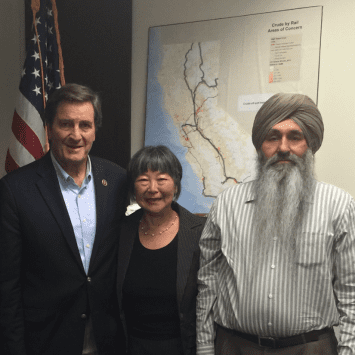


SACRAMENTO, CA, USA—”Modi’s history is well known,” Northern California Congressman John Garamendi told advocates for Indian minorities who met him on Wednesday to voice their concerns about the Indian Prime Minister’s upcoming visit to the state.
“We are deeply disturbed by Modi’s planned visit to California considering he previously faced a 10-year ban on entering the U.S. due to orchestrating a 2002 genocide of Muslims,” says Bhajan Singh, founder of US-based human rights group Organization for Minorities of India (OFMI). “Congressman Garamendi, who knows about Modi’s past, paid serious attention as I further explained that India tolerates the world’s severest persecution of Christians, has provided no justice for the 1984 Sikh Genocide, and has a reputation for committing state-sponsored atrocities against religious minorities.”
Singh was joined at the meeting by former State Assemblywoman Mariko Yamada; Darshan Mundy, a representative of West Sacramento Gurdwara (the region’s largest Sikh institution), planned to attend but was prevented by illness.
During the meeting, Singh reports that the congressman expressed particular concern about the anti-conversion laws enforced in six Indian states. Last year, UN Special Rapporteur Heiner Bielefeldt said the laws, which require government approval of a person’s religious conversion, represent a “disrespect of freedom of religion.” In July, Indian journalist John Dayal said anti-conversion laws “shut the door on freedom of faith” and warned they are a contributing factor to creating “an underground church, for all intents and purposes, at par, I would say, with the underground church in China.”
The laws were a key focus of House Resolution 417, which was introduced in November 2013 to formally recommend that “religious freedom and related human rights” issues be made the cornerstone of joint U.S-India dialogues. The bipartisan resolution gained 51 congressional cosponsors before being abandoned in committee despite staunch support from Indian minorities and a variety of U.S. religious liberty advocates. Among other points, it would have commended the U.S. government for denying a visa to Indian PM Narendra Modi “on the grounds of religious freedom violations.”
Garamendi, who was not a cosponsor, pledged at the September 2 meeting to revisit the resolution.
“The ongoing issue of Bapu Surat Singh Khalsa’s hunger-strike in Punjab was also a chief topic of discussion,” says Singh. Garamendi, in response to OFMI requests, previously joined five colleagues in signing an April 15 letter to U.S. Secretary of State John Kerry on behalf of Khalsa and his son, Ravinderjit Singh Gogi, after the two were arrested in India. Khalsa, 83, began an hunger-strike protest in January to demand release for Sikh political prisoners held past their court-appointed sentences. He has faced repeated arrest and force-feeding by Indian authorities. Singh reports that the congressman, who is co-chair of the American Sikh Caucus, responded with favorable interest to updates on Khalsa’s situation.
Former Assemblywoman Yamada, Singh also notes, surprised the congressman when she praised OFMI for preventing installation of a Gandhi statue on the grounds of the CA State Capitol by visiting her office in 2008 to oppose the proposal.




